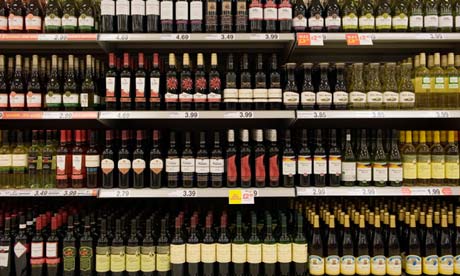
Options for a minimum price on alcohol will be announced by the government this week, as David Cameron launches a consultation on his attempt to crack down on cheap booze, blamed for fuelling anti-social behaviour and drink problems.
The report, due on Wednesday, is thought to recommend three possible prices for each unit - measured as 10ml or 8g of pure alcohol - of 40p, 45p or 50p.
Downing Street said on Sunday it had not been decided if the prime minister would express his preference, though in the past he and home secretary Theresa May have talked about the benefits of a price of 40p a unit.
That could mean the cheapest pint of lager or cider at an off-licence or supermarket would be about £1 and the cheapest bottle of wine about £4.
According to the drinks and retail industry-funded website, drinkaware.co.uk, one unit of alcohol equates to approximately one shot of whisky, a third of a pint of beer or half of a standard 175ml glass of wine.
The minimum pricing policy has been strongly backed by health professionals: last week the Alcohol Health Alliance, whose members include the British Medical Association and the Royal College of Nursing, wrote to the Sunday Times urging the government to set the unit price at 50p to protect the heaviest drinkers and those around them, including children.
Cameron's support for the policy has drawn criticism that it will penalise moderate drinkers, and warnings that if the price is set too high sales will fall, reducing alcohol duty paid to the Treasury.
On Sunday the Wine & Spirit Trade Association highlighted research showing widepread public oppposition to a minimum unit price for alcohol, principly because of disbelief about the benefits and concern about penalising moderate drinkers.
The research, published in the online peer-reviewed journal BMC Public Health, suggested public support could be won over, adding that the results of 28 focus groups "also suggest that clearer educational messages are needed to dispel misconceptions regarding the effectiveness of the policy, and the introduction of the policy as part of a package of government initiatives to address excess alcohol consumption might be the best way to advance support for the policy."
Announcing the alcohol strategy in March this year, Cameron defended a minimum price policy. "When beer is cheaper than water, it's just too easy for people to get drunk on cheap alcohol at home before they even set foot in the pub," the PM wrote in the foreword. "[Minimum pricing] isn't about stopping responsible drinking, adding burdens on business or some new kind of stealth tax – it's about fast immediate action where universal change is needed.
"And let's be clear. This will not hurt pubs. A pint is two units. If the minimum price is 40p a unit, it won't affect the price of a pint. In fact, pubs may benefit by making the cheap alternatives in supermarkets more expensive.
"Of course, I know this won't be universally popular. But the responsibility of being in government isn't always about doing the popular thing. It's about doing the right thing."

